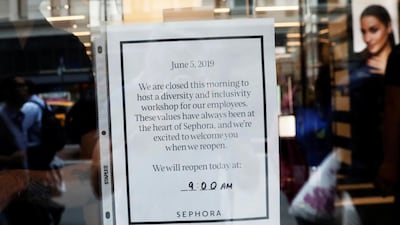According to the writer Maya Angelou, “Prejudice is a burden that confuses the past, threatens the future and renders the present inaccessible.”
Learning from history, understanding how it affects the present day, and working to secure a more egalitarian future are big, heated discussions. In the here and now, however, the biggest obstacle in ordinary life is what Angelou describes as making the present inaccessible. This means that some people, owing to their race, background, religion or orientation are denied the full enjoyment of their own lives, and may be hampered or even harassed while going about the basic, day-to-day activities of daily life.
Just ask the American singer SZA. She was shopping in a Sephora store in California in April when an employee called security to check she wasn't stealing. SZA is black. Studies show that black people are more likely to be stopped for shoplifting whereas actual shoplifters are more likely to be white. SZA tweeted about her experience, and Sephora responded that it was "sorry" to hear about what had happened and that it takes such complaints "very seriously." So much so that on Wednesday this week, Sephora closed all 400 of its US stores for an hour to give its 16,000 staff diversity training.
This move came exactly a day before the launch of its new marketing campaign, titled “We Belong to Something Beautiful”. Sephora says that the training sessions were not designed in response to the incident with SZA, but has been in development much longer.
Being carried out the day before a new marketing campaign, lasting just one hour, involving the very visible closing of all the company’s shops and accompanied by international coverage… call me cynical but it’s hard not to think of this as great marketing, rather than a commitment to real root-and-branch change.
Sephora is not the first brand to have made a dramatic intervention related to matters of diversity. Last May, Starbucks closed 8,000 stores for a day of training after two black men were arrested for doing nothing more than waiting for a business meeting in one of its shops.
Social media has become a powerful tool to expose the blatant prejudice faced by many people, and to amplify anti-racist feeling, which ensures that brands face the full wrath of consumers who find such behaviour unacceptable.
Corporate PR managers must survey social media in dread of their brand tripping up on diversity-related matters. Some observers might also be sceptical about diversity training, viewing it as a way for brands to protect their reputations, rather than a genuine attempt to make a difference to the world. Let me be clear: striving for a more inclusive workplace is a good thing, and every little helps, but such efforts have to go far beyond mere PR.
There are many different aspects of businesses where diversity – or, more precisely, its absence, or a lack of commitment to it as a principle – has a massive impact on a company’s standing. Sephora and Starbucks provide shocking examples in the area of customer service.
However, it is equally important diversity is integrated within the process of product development. Take the beauty industry, for example. A quick look at the colour palettes and descriptions used over the years tell a clear story. Colours are typically fixed around whiter skin tones. This is why a pale, peachy pink is considered a “nude” colour, which, in turn, suggests that everything else is an aberration.
Naturally, the area of communications is one where diversity or the lack of it is highly visible, yet failure abounds in advertising. Beauty is an industry based around image and representation, so it’s no surprise to see that Sephora’s latest campaign is based on commitment to diversity. Still, many of us have been left wondering if it is following consumer trends or leading them.
Rather than concentrating on their public faces, companies that wish to make a real commitment to diversity should look to their internal cultures. Ensuring that people of diverse backgrounds are represented in leadership roles is vital. Studies also show that such employees are less likely to be retained in organisations, dropping off the radar even sooner than women. Being listened to, respected and of course properly paid are key. Returning to Angelou’s words, in this present moment these simple goals are inaccessible to many people from non-white backgrounds. An hour of training is not going to solve that, but I suppose it’s a start.
Shelina Janmohamed is the author of Love in a Headscarf and Generation M: Young Muslims Changing the World

